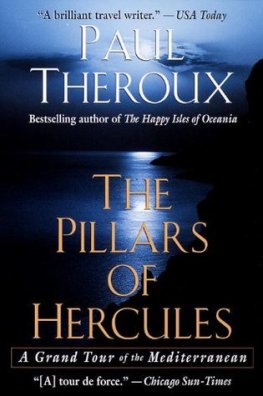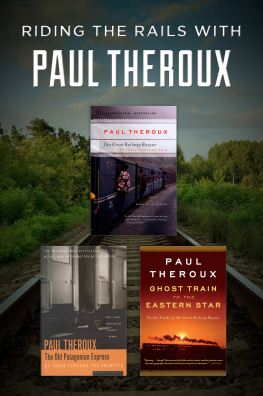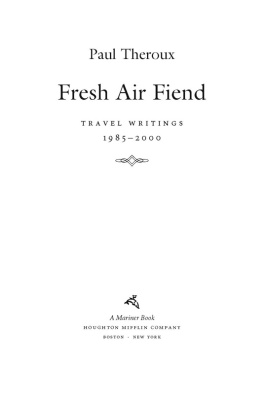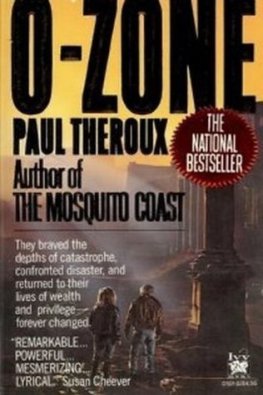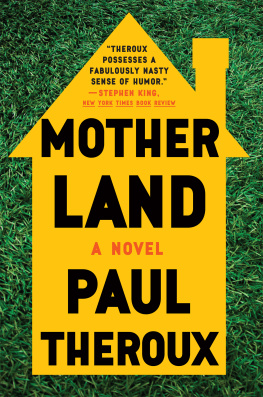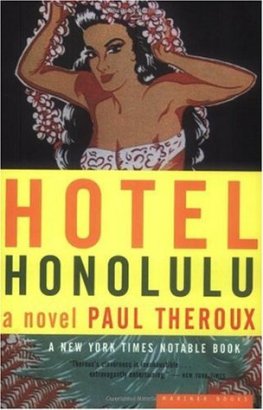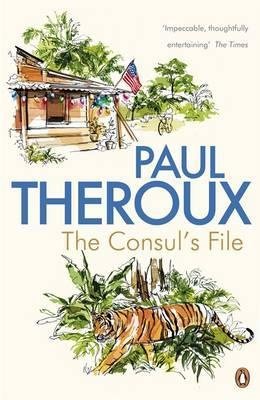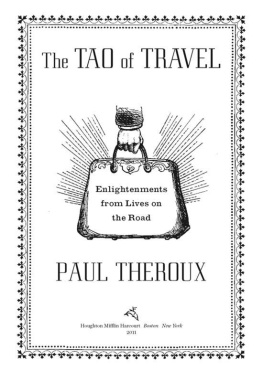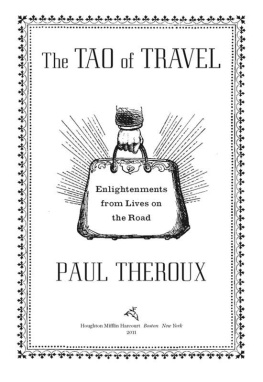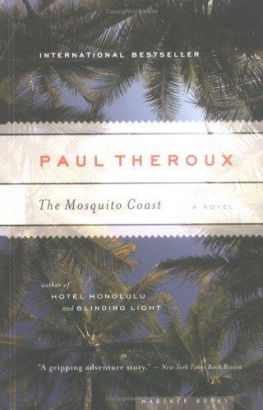A MARINER BOOK
HOUGHTON MIFFLIN COMPANY
BOSTON NEW YORK
First Mariner Books edition 2006
Copyright 1983 by Cape Cod Scriveners Company
ALL RIGHTS RESERVED
For information about permission to reproduce selections
from this book, write to Permissions, Houghton Mifflin Company,
215 Park Avenue South, New York, New York 10003.
Visit our Web site: www.houghtonmifflinbooks.com.
Library of Congress Cataloging-in-Publication Data
Theroux, Paul.
The kingdom by the sea.
1. Great BritainDescription and travel.
2. Railroad travelGreat Britain. 3. Theroux, Paul.
1. Title.
DA 632. T 46 1983 914.1'04858 83-10838
ISBN 0-395-34645-2
ISBN -13: 978-0-618-65895-4 (pbk.)
ISBN -10: 0-618-65895-5 (pbk.)
Printed in the United States of America
DOM 10 9 8 7 6 5 4 3 2
I dedicate this Book to those friends of mine in Britain who, giving me a welcome I must ever gratefully and proudly remember, left my judgment free; and who, loving their country, can bear the truth, when it is told good-humoredly and in a kind spirit.
(Adapted from CHARLES DICKENS'
dedication to American Notes, 1842)
...it takes passionate pilgrims, vague aliens, and other disinherited persons to appreciate the "points" of this admirable country.
HENRY JAMES, English Hours
This is one of the lessons of travelthat some of the strangest races dwell next door to you at home.
ROBERT LOUIS STEVENSON, Across the Plains
Contents
1. The 11:33 to Margate 1
2. An Evening Train to Deal 16
3. The Branch Line to Hastings 34
4. The 18:11 to Bognor Regis 53
5. A Morning Train to the Isle of Wight 65
6. The Inter-City 125 to Plymouth 87
7. The Cornish Explorer 101
8. The Branch Line to Barnstaple 121
9. The West Somerset Railway 131
10. The 16:28 to Tenby 142
11. The 10:32 to Criccieth 159
12. The 20:20 to Llandudno Junction 175
13. The 16:01 to Southport 188
14. The West Cumbria Line 201
15. The Boat Train to Ulster 212
16. The 10:23 to Londonderry 227
17. The 15:53 to Belfast 243
18. The 16:30 to Mallaig 254
19. The Flyer to Cape Wrath 269
20. The 14:40 to Aberdeen 283
21. The 9:51 to Leuchars Junction 291
22. The Last Train to Whitby 304
23. Disused Railway Line 317
24. The North Norfolk Railway 328
25. Striking Southend 340
1. The 11:33 to Margate
E VERYONE seemed to be going to China that year, or else writing rude things about the Arabs, or being frank about Africa. I had other things on my mind. After eleven years in London I still had not been much in Britain. I had not set foot in Wales or even East Anglia. People joked about Bognor Regis. I had never been to Bognor Regis. But I joked about it too! And where was Porlock? And was Northern Ireland a nightmare and Scotland breathtaking? And what exactly were the Lincolnshire Wolds? What I knew of Britain I had got from books. Britain was the most written-about country in the world. That was the problem, really. You read one book about China and you think you've got a good idea of the place; you read twenty books about Britain, even English Traits and Rural Rides, and you know you haven't got the slightest.
I lived in London for half the year, and the rest of the time went away. I had come to dislike the city. "A man who is tired of London is tired of life"no, I was tired of hunting for parking places, tired of the crowds and the scribbled-on walls, the dirty old buildings and the ugly new ones. I was sick of London traffic and London presumptions and London smugness. And the gray underwear on London clotheslines hanging limply under baggy clouds made me sad. London did not regard itself as a city but rather as an independent republic. Sometimes it seemed as big as Belgium; it could take a whole day to cross it by car. I was also bored with London books, which had titles like Britain: What Went Wrong? and Is Britain Dying? London people said that what was wrong with Britain was wrong with the western hemisphere. Like many other London people I did not really live in Britain. This floating kingdom was a foreign country.
Britain was nearby, but "nearby" was misleading. Distances in Britain were meaninglessso many places were so hard to get to, or else hated outsiders, or were names of villages that no longer existed: so much of Britain lay buried. I knew a little bit about some parts, because in Britain there was an oral tradition that took the place of travel, like the Bognor jokes and Scotland was breathtaking and Cornwall was creepy and South Wales was awful and Rye was ever so lovely. Everyone appeared to know everything. It was word of mouth. Scotland had the Highlands, Cambridgeshire the Fens, and Norfolk the Broadsthe words called up peaks and thickets and puddles. Northerners sounded to me as though they had learned English in language labs. In London, I had once mistaken a Welshman for a Dutchmansomething in his inquiring voice. As for the Irish, I had never personally known anyone in London who took an Irishman seriously unless the Irishman was armed. "Bogtrotters," people usually said. "Micks are friendly!" I had never met a soul in London who had been to Northern Ireland.
I did not know anything, and I was beginning to think that I was as bad and lazy as everyone else.
Once, from behind a closed door, I heard an Englishwoman exclaim with real pleasure, "They are junny, the Yanks!" And I crept away and laughed to think that an English person was saying such a thing. And I thought: They wallpaper their ceilings! They put little knitted bobble-hats on their soft-boiled eggs to keep them warm! They don't give you bags in supermarkets! They say sorry when you step on their toes! Their government makes them get a hundred-dollar license every year for watching television! They issue drivers' licenses that are valid for thirty or forty yearsmine expires in the year 2011! They charge you for matches when you buy cigarettes! They smoke on buses! They drive on the left! They spy for the Russians! They say "nigger" and "Jewboy" without flinching! They call their houses Holmleigh and Sparrow View! They sunbathe in their underwear! They don't say "You're welcome"! They still have milk bottles and milkmen, and junk-dealers with horse-drawn wagons! They love candy and Lucozade and leftovers called bubble-and-squeak! They live in Barking and Dorking and Shellow Bowells! They have amazing names, like Mr. Eatwell and Lady Inkpen and Major Twaddle and Miss Tosh! And they think we're funny?
The longer I lived in London, the more I came to see how much of Englishness was bluff and what wet blankets they could be. You told an Englishman you were planning a trip around Britain and he said, "It sounds about as much fun as chasing a mouse around a pisspot." They could be deeply dismissive and self-critical. "We're awful," they said. "This country is hopeless. We're never prepared for anything. Nothing works properly." But being self-critical in this way was also a tactic for remaining ineffectual. It was surrender.
And when an English person said "we," he did not mean himselfhe meant the classes above and below him, the people he thought should be taking decisions, and the people who should be following. "We" meant everyone else.
"Mustn't grumble" was the most English of expressions. English patience was mingled inertia and despair. What was the use? But Americans did nothing but grumble! Americans also boasted. "I do some pretty incredible things" was not an English expression. "I'm fairly keen" was not American. Americans were showoffsit was part of our innocencewe often fell on our faces; the English seldom showed off, so they seldom looked like fools. The English liked especially to mock the qualities in other people they admitted they didn't have themselves. And sometimes they found us truly maddening. In America you were admired for getting ahead, elbowing forward, rising, pushing in. In England this behavior was hatedit was the way wops acted, it was "Chinese fire drill," it was disorder. But making a quick buck was also a form of queue-jumping, and getting ahead was a form of rudeness: a "bounder" was a person who had moved out of his class. It was not a question of forgiving such things; it was, simply, that they were never forgotten. The English had long merciless memories.
Next page

